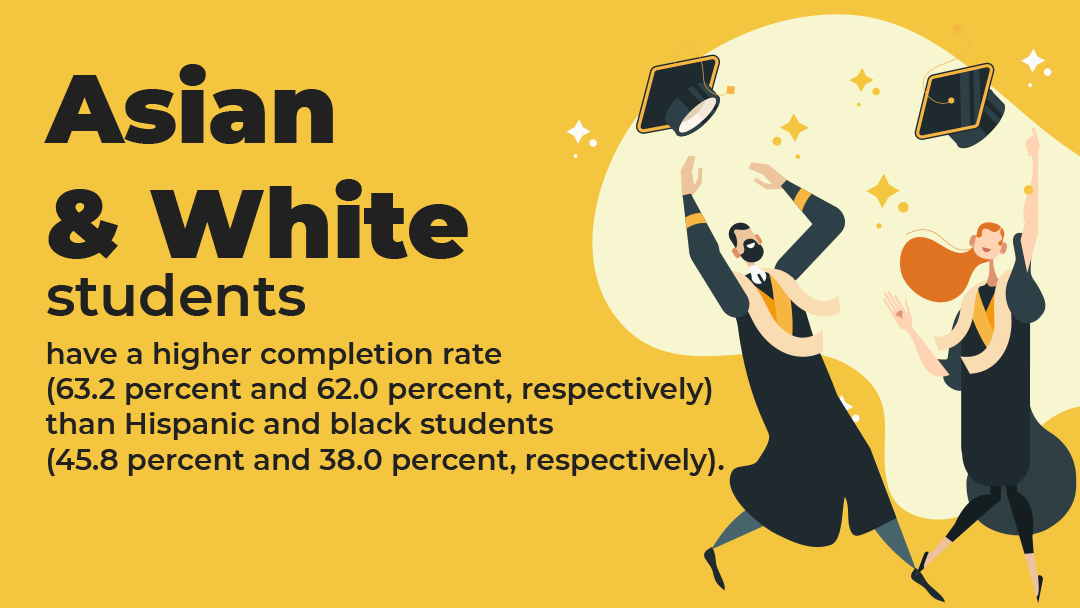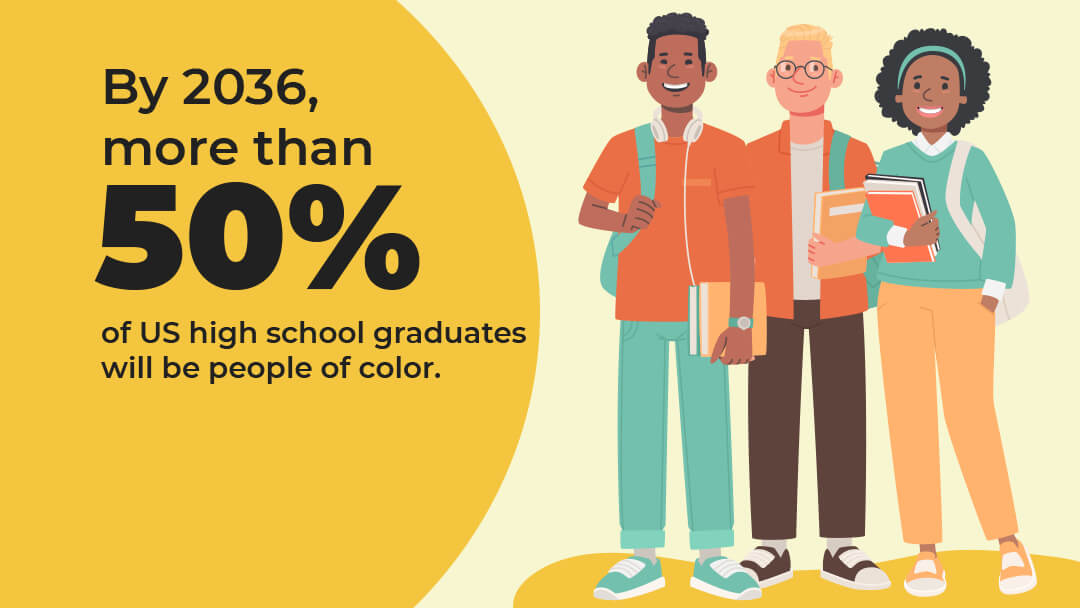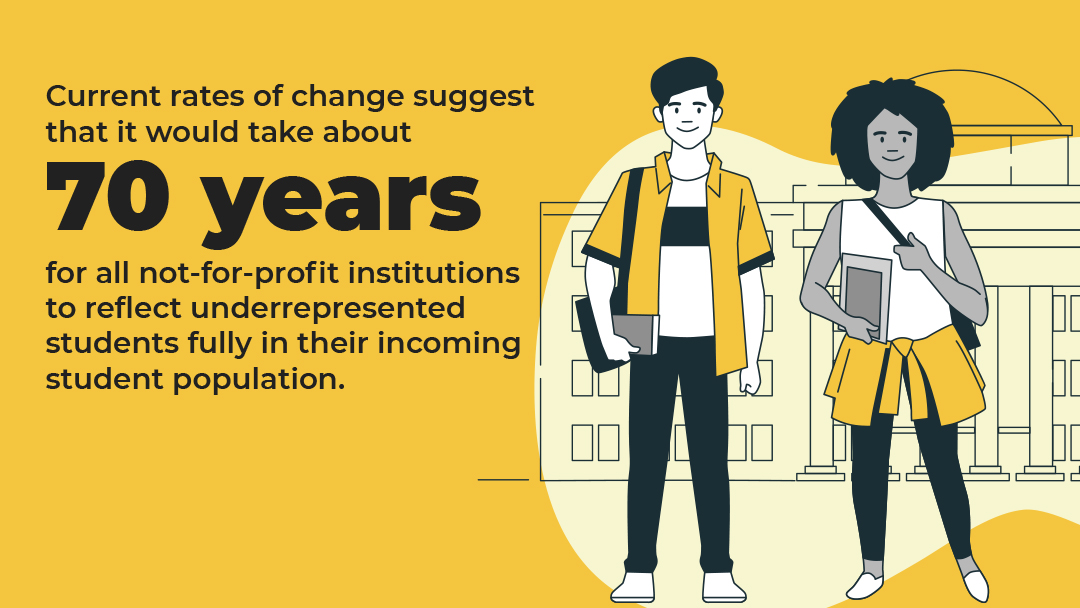
As a BIPOC student or parent, you may feel more lost than others when it comes to applying for college, getting into college, and navigating the world once in college. You are not imagining this – non-white school districts get $23 BILLION less than their white counterparts, and this is money that goes toward subject matter, educators, and college counseling, among other things .
As a result, BIPOC students are often less prepared for college than their white and Asian counterparts, and this is worrisome for the state of higher education.

If you can get enrolled in college, then there are other things to worry about, from general mental health concerns to systemic racism.
Here, we’ve curated a comprehensive list of helpful resources that will help students, parents, teachers, college counselors and community members to cultivate awareness, become allies, form affinity groups and take care of mental health concerns, from the time you become interested in higher education, all the way through your time as an enrolled student.
We hope you find these helpful.
BIPOC in Higher Education
Systemic Racism in Higher Education
The authors of this article looked at the low number of Latinx and African American students in STEM programs and how to change it.
Success for All? A Call to Reexamine How Student Success is Defined in Higher Education
The two authors behind this piece focus on why BIPOC students and others have issues in college and call out schools for not doing more.
This article serves as a response to the problems that BIPOC students face and brings up some new points that readers should know.
Rethinking Race, Ethnicity, and the Assessment of Intercultural Competence in Higher Education
Get a better look at how different cultural backgrounds affect students and what it means to have a different race or ethnicity.
Disrupting the Big Lie: Higher Education and Whitelash in a Post/Colorblind Era
In this article, readers get a better look at the “white lie” concept and whether it still has meaning in today’s world.
The author of this article focuses on how the arts field is still dominated by white artists and how some BIPOC artists hope to change that
Questioning the Science: How Quantitative Methodologies Perpetuate Inequity in Higher Education
Readers will learn how some assessment methods no longer work as well in higher education, especially among BIPOC students.
Available as a PDF, this resource looks at how social anxiety can affect students and change the experiences they have in college.
Mental Health, Substance Abuse, and Wellbeing in Higher Education
Two authors researched well-being, substance abuse, and mental health to look at how those factors impact today’s college students.
No Study Without Struggle: Confronting Settler Colonialism in Higher Education
Leigh Patel takes a detailed look at colonialism and how white people established the programs that students of color enroll in every year.
Mental Health
Get help finding a therapist with experience helping those in the Latinx community with this site, which offers some free resources, too.
Similar to the last site, Therapy for Black Girls is a site that gives Black women a place to turn when they need help with their mental health.
This organization wants to change the way that others think about mental health with programs that target students in college and at other levels.
With workshops, training sessions, and free resources, the Steve Fund provides help for anyone struggling with their mental health.
BEAM is the Black Emotional and Mental Health Collective, which offers community events, workshops, seminars, and other programs for Black men and women.
We R Native helps Native students and adults get advice on different topics and find free mental health resources online and off.
Asian Mental Health Collective
The directory on this site helps users find Asian therapists both in the United States and Canada as well as other mental health resources.
Call this toll-free number created by The Steve Fund to reach someone who will listen and offer support during any hour of the day or night.
Another option for those who need help over the phone is Blackline, which focuses on the mental health and well-being of African Americans.
Joining the Black Mental Health Alliance allows members to attend the Mind Health talks every month and engage in other activities.
This organization wants to empower young Black women to lead better lives and offers therapy assistance and other programs for those in need.
Black men who worry about their mental health can turn to this site to sign up for one of the special programs or get help finding a therapist.
Activism
This site takes a detailed look at topics that most classrooms do not address such as white supremacy and violence against people of color.
Ourselves Black has an online library filled with articles about African American mental health as well as links to therapists who help Black patients.
The Community Health Network supplies users with tool kits and other mental health resources for LGBTQIA people who struggle with their feelings.
Racial Battle Fatigue: What is it and What are the Symptoms?
Morgan Taylor Goodwin tackles Racial Battle Fatigue and goes over both its symptoms and why it makes some feel so tired today.
In this PDF, readers will find out more about some of the traumatic events that affected BIPOC and learn how they can recover from them.
Filling our Cups: 4 Ways People of Color Can Foster Mental Health and Practice Restorative Healing
Take a look at some of the four key ways in which BIPOC can improve their mental health and begin the healing process quickly.
This online toolkit looks at the issue of healing justice and helps readers see what they can do when they are ready to heal.
Stanford University offers this detailed guide on the physical, emotional, and other signs of traumatic stress and looks at ways to cope.
Coping with Anticipatory Grief
A medical doctor wrote this article to help others learn how they can cope and prepare for the grief they feel when a loved one passes away.
Wellness
This collection of wellness tools includes journal prompts for those who write down their feelings and questions that help them reflect on their experiences.
Check out the tools and strategies that help BIPOC visitors learn how to improve their mental health and cope with any challenges they face
5 Self-Care Practices Black People Can Use While Coping With Trauma
Learn five simple strategies designed for POC to cope with and handle the traumatic experiences they had in the past.
Heal Haus helps others learn to connect their mind, body, and spirit through classes they can take in the studio or online.
Visit this Instagram account to learn more about the benefits of napping and how anyone can get the healthy sleep they need.
Contextualizing BIPOC Youth Mental Health
Created by the National Black Women’s Institute, this article features statistics on BIPOC mental health and looks at how it reached this point.
BIPOC/AAPI Mental Health Resources
Uncover a list of BIPOC resources and AAPI help such as articles on common conditions and links to therapist directories.
How Adults Can Help Improve the Mental Health of Black Youth
People of all ages can use this site to find ways that they can help Black youth with the trauma and mental health conditions they have.
Resources for Communities of Color
Therapy directories, toll-free hotlines, and links to online articles for POC are just some of the resources available from this site.
Work2BWell is a new program for BIPOC teens that gives them a safe place to talk about their challenges and get help with their needs.

Financial Help for College
Financial Aid and Student Loans
Find out more about the student loans and other financial aid that the government offers for college students on this official government site.
Types of Financial Aid: Loans, Grants, and Work-Study Programs
Federal Student Aid goes over the top options for today’s college students and shows them how to apply for an aid package.
American Indian College Fund Student Resources
American Indian students will find a variety of resources on this site such as scholarships to pay for school and programs that offer work experience.
Discover all of the top scholarships for BIPOC students and how to apply for each one with this page.
Get access to free prep programs and other help on this site, which also shows how students qualify for a fee waiver when they take the ACT.
Students who plan to take the SAT can use this site to find out the best way to apply for a waiver that covers the testing fee.
College Application Fee Waivers
The College Board released this PDF to show students all of the schools that will waive their application fees.
Available from the National Association for College Admission Counseling (NACAC), this site tells students how they can apply without paying a fee.
College Admissions Counseling for BIPOC
College Greenlight believes that every student deserves the right to higher education and offers resources to make that happen.
Anyone who needs help during the admissions process can turn to College Point for help from peers who were once in the same position.
How University Counseling Centers Can Better Serve BIPOC Students
UC Denver takes a look at racial battle fatigue and other issues to show counseling centers how they can better support and help BIPOC students.
How to (and How Not to) Recruit Minority Students
Inside Ed gives admissions counselors and others help on how to avoid racial biases when recruiting students of color and what they should not do.
Microaggressions, BIPOC Solidarity, and Affirmative Action in College Admissions
Dear Dark Skinned Student talks about affirmative action and other issues that affect the admissions process to show students what they’re up against.
Race-Conscious Admissions Policies Are Crucial to an Equitable Society
Find out more about the effects that COVID had on the BIPOC population, especially when it comes to college admissions in this article.
How Ending Legacy Admissions Can Help Achieve Greater Education Equality
The ACLU uses this article to tackle legacy admissions in modern schools and how getting rid of those programs will benefit students of color.
Advancing Diversity and Inclusion in Higher Education
Check out the statistics and data available in this PDF to see how inclusion and diversity will change the future landscape of college students.
Equalizing College Access: A Path to Prosperity For all
The Student Leadership Network talks with minority students about the barriers they faced going to college to look at what needs to change.
‘The Black Family’s Guide to College Admissions’ Helps Address Unique Challenges
This page includes an excerpt from the book of the same name that helps parents and families prepare their children of color for the admissions process.
This doctorate paper focuses on how BIPOC students can get the outcomes they deserve and tackle the barriers they come across.
College Students of Color: Overcoming Racial Disparities and Discrimination
Check out this article to see the discrimination and other challenges that students of color face in college settings.
The College Equity Index: A Spark for Change
Cyndy McDonald hosted this podcast that focuses on the changes colleges need to make at the admissions level and beyond.
Lessons for Engaging and Retaining BIPOC Students
The Opportunity Network offers four solid tips for schools that help them appeal to and keep the BIPOC students who attend.
Want to Talk Reparations? Let’s Start with Decolonizing Higher Education
In this article, Jamara Wakefield uses her experiences as a person of color to talk about what changes higher education needs to make.
Why We Need to Talk About the Decolonization of Higher Education
Learn more about what decolonization means in higher education with this article, which offers a frank discussion on the topic.
Decolonizing Academic Advising and Moving Toward an Asset-Based Advising Approach
This piece from Wayne State University looks at how schools can move forward and help students of color with the right approach.
Community Help
Find help offers support from BIPOC and others such as financial support and food banks that are available in their zip codes.
What Supports Do BIPOC Students Need?
The United Way of Salt Lake offers practical advice for educators and gives them tips on how to get invested in the lives of their BIPOC students.
This site shares some of the special programs offered by The BIPOC Project that seek to help BIPOC students and other students of color.
3 Ways to Support BIPOC Students in the Classroom
Discover tips on how to become a BIPOC ally and other ways to make those students feel more included with help from the Teaching Channel.
4 Ways Educators Can Lift Up BIPOC Communities
Christine Pitts discusses some of the ways teachers can help BIPOC students and their communities in this NWEA piece.
Learn more about the anxiety and depression rates in BIPOC communities here and what resources can help.
This dissertation looks at the ways to create better spaces and communities for BIPOC students at colleges that have a history of racism.
Check out some of the programs designed for BIPOC students that support them and give them more help in and out of college.
Establishing BIPOC Orgs On Campus/Affinity Group Resources
Learning for Justice designed this toolkit to help students launch affinity groups on their campuses that support BIPOC students.
Racial Affinity Groups: Guide for School Leaders
Teachers at all levels can turn to this site to find out how they can create affinity groups and lead them in their schools.
How to Establish an Affinity Group
Syracuse University created a detailed guide that goes over all of the steps needed to create and launch a college affinity group.
Educational Affinity Groups: The Why and How
Find out more about what affinity groups do on this site and the benefits they have on college campuses across the country.
Best Practices of Affinity Groups in Independent Schools
Cindy P. Chung wrote her dissertation on the best practices of affinity groups and how they helped BIPOC students.
How Racial Affinity Groups Saved My Life
The author of this piece details how much support she received from affinity groups and why she thinks they’re so important.
Check out this program to see why minority students gravitate towards affinity groups and the help they get from them.
How to Create an Affinity Group
Anyone interested in launching an affinity group on their college campus will find tips here along with some great resources.
Creating a Sense of Belonging for BIPOC in a College Course
This article covers the goals of programs designed to give BIPOC students a sense of community and what others on the campus can do.
How to Create Inclusive Environments for Black Students on Predominately White College Campuses
Not only does this article cover the challenges that white campuses have for BIPOC students, but it also looks at the best ways to make them feel included.
Antiracism on Campus/Avoiding Racism
Eight Actions to Reduce Racism in College Classrooms
Two college professors created this piece to share eight ways that other professors can end the racism they see in their schools and classrooms.
The University of Michigan created a list of 10 ways that anyone can support BIPOC students and prevent racism on their campuses.
Preventing Hate Crimes and Bias Incidents on Campus: Programs that Make a Difference
Filled with statistics and other information, this article takes an in-depth look at some of the anti-racism programs that make the biggest difference.
Reducing Racism in Schools: The Promise of Anti-Racist Policies
Released by the School of Education at UCONN, this article looks at the areas that need help and what schools can do to prevent racism.
Pushing Back Against Racism and Xenophobia on Campuses
In this opinion piece, three authors talk about their past experiences and how they fought back against the racism they encountered.
How Social Media is Helping Students of Color Speak Out About Racism on Campus
PBS released this article to look at some of the successful ways BIPOC students used social media to their advantage when talking about racism.
3 Vital Steps for Uprooting Racism on University Campuses
This article focuses on the positive approaches to battling racism and the steps that work as well as those that were less successful.
A Framework for Advancing Anti-Racism Strategy on Campus
Find out the top 10 priority areas that professionals named and the strategies they believe any college campus can use to combat racism,
Personal Growth and Counseling Center
A branch of California State University created this page that looks at the connection between race and stress and how to overcome it.
Together and Alone? The Challenge of Talking about Racism on Campus
Beverly Daniel Tatum focuses on how talking about racism in school can make students feel both connected to others and more alone.
Teaching about Race and Racism in College Classrooms
The author of this piece looks at how teachers can talk about racism and race with their students without making anyone feel uncomfortable.
In this PDF, readers learn about the steps they can take to tackle the idea of racial harassment and what it means in the academic field.

